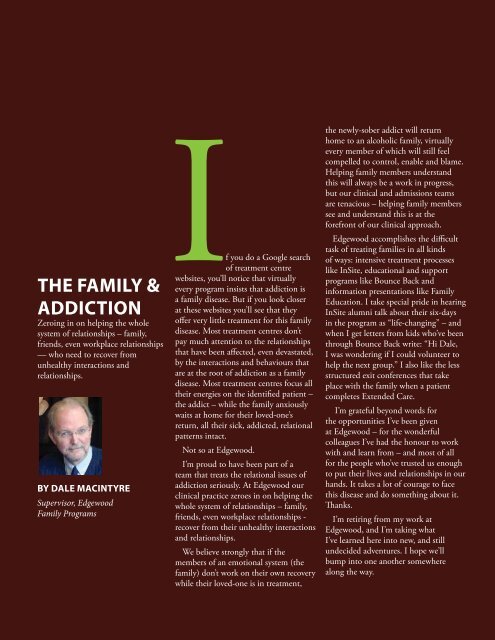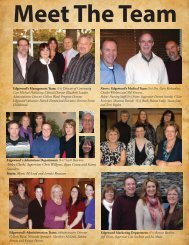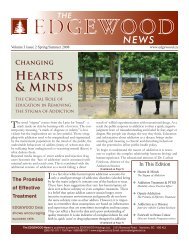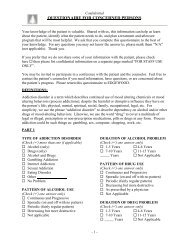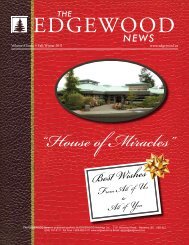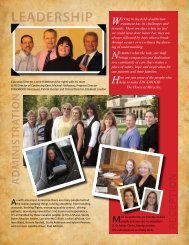Friday, March 1, 2013 - EDGEWOOD Addiction Treatment
Friday, March 1, 2013 - EDGEWOOD Addiction Treatment
Friday, March 1, 2013 - EDGEWOOD Addiction Treatment
You also want an ePaper? Increase the reach of your titles
YUMPU automatically turns print PDFs into web optimized ePapers that Google loves.
<strong>EDGEWOOD</strong> News<br />
The family &<br />
addiction<br />
Zeroing in on helping the whole<br />
system of relationships – family,<br />
friends, even workplace relationships<br />
— who need to recover from<br />
unhealthy interactions and<br />
relationships.<br />
BY dale macintyre<br />
Supervisor, Edgewood<br />
Family Programs<br />
If you do a Google search<br />
of treatment centre<br />
websites, you’ll notice that virtually<br />
every program insists that addiction is<br />
a family disease. But if you look closer<br />
at these websites you’ll see that they<br />
offer very little treatment for this family<br />
disease. Most treatment centres don’t<br />
pay much attention to the relationships<br />
that have been affected, even devastated,<br />
by the interactions and behaviours that<br />
are at the root of addiction as a family<br />
disease. Most treatment centres focus all<br />
their energies on the identified patient –<br />
the addict – while the family anxiously<br />
waits at home for their loved-one’s<br />
return, all their sick, addicted, relational<br />
patterns intact.<br />
Not so at Edgewood.<br />
I’m proud to have been part of a<br />
team that treats the relational issues of<br />
addiction seriously. At Edgewood our<br />
clinical practice zeroes in on helping the<br />
whole system of relationships – family,<br />
friends, even workplace relationships -<br />
recover from their unhealthy interactions<br />
and relationships.<br />
We believe strongly that if the<br />
members of an emotional system (the<br />
family) don’t work on their own recovery<br />
while their loved-one is in treatment,<br />
the newly-sober addict will return<br />
home to an alcoholic family, virtually<br />
every member of which will still feel<br />
compelled to control, enable and blame.<br />
Helping family members understand<br />
this will always be a work in progress,<br />
but our clinical and admissions teams<br />
are tenacious – helping family members<br />
see and understand this is at the<br />
forefront of our clinical approach.<br />
Edgewood accomplishes the difficult<br />
task of treating families in all kinds<br />
of ways: intensive treatment processes<br />
like InSite, educational and support<br />
programs like Bounce Back and<br />
information presentations like Family<br />
Education. I take special pride in hearing<br />
InSite alumni talk about their six-days<br />
in the program as “life-changing” – and<br />
when I get letters from kids who’ve been<br />
through Bounce Back write: “Hi Dale,<br />
I was wondering if I could volunteer to<br />
help the next group.” I also like the less<br />
structured exit conferences that take<br />
place with the family when a patient<br />
completes Extended Care.<br />
I’m grateful beyond words for<br />
the opportunities I’ve been given<br />
at Edgewood – for the wonderful<br />
colleagues I’ve had the honour to work<br />
with and learn from – and most of all<br />
for the people who’ve trusted us enough<br />
to put their lives and relationships in our<br />
hands. It takes a lot of courage to face<br />
this disease and do something about it.<br />
Thanks.<br />
I’m retiring from my work at<br />
Edgewood, and I’m taking what<br />
I’ve learned here into new, and still<br />
undecided adventures. I hope we’ll<br />
bump into one another somewhere<br />
along the way.<br />
14 <strong>EDGEWOOD</strong> News


